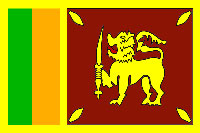Sri Lanka refutes UN statement about abuse and torture
Sri Lanka's Ministry of Disaster Management and Human Rights refuted the UN experts' report that Sri Lanka's military and police perpetrate violence and abuse, and claimed there was no need for an independent human rights institution.

Manfred Nowak, the U.N.'s independent expert on torture and other cruel and degrading punishment, told the U.N. General Assembly's human rights committee Monday that he had heard "numerous consistent and credible allegations from detainees who reported that they were ill-treated by the police" and that "similar allegations were received with respect to the army."
Nowak said the torture methods reported to him during recent visits to Sri Lankan prisons and police cells included beatings with various weapons, including on the soles of the feet, blows to the ears, suspension in various positions, burning with metal objects and cigarettes, asphyxiation with plastic bags with chili pepper or gasoline, "and various forms of genital torture."
In a statement Tuesday, Sri Lanka's Ministry of Disaster Management and Human Rights said it was considering the U.N. report, and argued that the level of complaints of torture made by detainees to the government's Human Rights Commission was very low.
"The government has adopted a zero-tolerance policy on torture and is closely studying Mr. Nowak's preliminary recommendation with a view to strengthening local institutional and legal frameworks to ensure strict adherence with that policy," the ministry statement said.
"Alleged instances of torture over a five-year period was consistently less than 0.02 percent per year of arrests made," it said.
The statement did not address the specific allegations of torture and abuse by the police and military.
Nowak also called for "a truly independent monitoring mechanism," centers to rehabilitate torture victims, an independent complaints system in prisons to look into torture and abuse allegations, and prompt investigation of torture allegations by an independent authority.
Talking to The Associated Press, Human Rights Minister Mahinda Samarasinghe said there was no need for an independent human rights body, but that the Human Rights Commission was not effective because of a lack of funds and personnel.
"We have asked the U.N to help us strengthen the local capacity. That's the only durable solution," Samarasinghe said.
Subscribe to Pravda.Ru Telegram channel, Facebook, RSS!


